- Home
- Diana Wynne Jones
Drowned Ammet (UK) Page 9
Drowned Ammet (UK) Read online
Page 9
As the soldiers puttered towards him, Mitt no longer had any doubt what he was doing. He was trying not to be caught. And as wave after wave of pure fear swept over him, he knew he was going to go on trying. By the time the soldiers were level with him, his terror was worse than the worst pain he had ever known. Mitt crouched down over his blazing legs, squeezing himself into himself to look as small as possible, and forced himself to put out a hand, take a marble, and roll it casually into the middle of the ring. He had to fight his terror every inch in order to move at all. He thought he could have rolled Siriol’s boat across the pavement more easily. The effort made him weak.
As soon as the marble left his hand, he was sure he had done the wrong thing. The boy next to him shot him a nasty look. The puttering boots went slower, as if the movement had attracted their attention. Mitt almost lost his senses, he was so terrified. Time swam forwards, sickeningly slow and blurred.
The boots puttered down past the hopscotch, stopped, and started again, in step this time. Clump-clump-clump, they went, away into faintness.
“Buzz off,” said the boy. “You spoilt my go.”
Mitt stumbled to his feet. He felt dizzy, and as cramped as if he had spent a winter night fishing. He had to limp down the street. None of the games started again. The children watched Mitt as they had watched the soldiers. Bad, that was bad. They would tell of him to someone. Mitt hoped they would not tell too soon because he felt far too tired to run. He felt like curling up in the nearest doorway and crying himself to sleep.
Get a hold of yourself! he thought angrily. You’re on the run, that’s all. People go on the run all the time in this place. I don’t know how it keeps happening, but it’s like I can’t help myself from running. What’s gone wrong with me? This was a question Mitt simply could not answer. He only knew that he had got up this morning, intending, as he had intended for the last four years, to finish Hadd and the Free Holanders at one stroke. And now he had failed to finish Hadd, his one idea seemed not to be caught.
Oh, now, wait a minute! Mitt stopped and pretended to loiter in a yard doorway. There were still the Free Holanders. If he was too scared to get himself caught, he could easily just go to Siriol’s house, or Dideo’s. Where Mitt went now, Harchad’s spies would swiftly follow. It was just as good a way of getting the Free Holanders caught. But the reason Mitt stopped, leaning on the doorpost and gaping at nothing, was that he was not even tempted. “Not even tempted!” he repeated to himself. And it was true. It was nothing dramatic. Mitt could not tell himself he would rather die than go to Siriol’s house – he knew he would do anything rather than die – but he was still not going there. Or to Dideo. “What do you think they are then? Friends?” Mitt asked himself derisively.
It seemed as if they were. He remembered the smile on Dideo’s netted face when Mitt brought him the first little packet of saltpetre, and Siriol glowering at him over a rope’s end but never hitting him more than just that once. And I reckon he ought to have done, Mitt thought. He ought to have knocked me through a Mitt-shaped hole in the side of Flower of Holand, over and over. He found himself smiling a little. Siriol always understood his jokes, and Ham scarcely ever did. Then there was Alda, puffing arris at everyone, and Lydda going to marry that sailor off Lovely Libby. I got to know them too well, Mitt thought.
It did no good to stand there, smiling and staring. Mitt walked on. He supposed his best plan was to use the escape arrangements Siriol had so carefully made for him.
“No!” Mitt exclaimed. It was not that he did not want to use them. He did. He would have given his ears to. But he could not remember a thing about them. Thinking he would not need to escape, he had attended to Siriol’s plans probably even less than he had listened to Hobin telling him about guns. He had a vague idea there was a cart somewhere and a password. But that was absolutely all he knew. Of all the fools!
But what was he to do? He could not spend the rest of his life sneaking round the streets of Holand. If he looked for all the carts he could find, he would certainly be caught. The soldiers would think of that. He dared not go home. That would get Hobin and Milda arrested too. The only thing he dared do was take to the Flate, like so many freedom fighters before him. But he knew a bit about that. You got hunted down there. And it was a miserable life unless you were lucky enough to have a gun and could shoot marsh birds for food. Mitt had no gun. He knew where guns were, though: locked up in Hobin’s workshop. And he dared not go near there. Oh, it went round in circles. Why hadn’t he attended to Siriol? Mitt knew why, really. He had simply not thought of anything beyond the moment when he was to plant that bomb. “I must be flaming insane!” Mitt said to himself. “Do something, can’t you!”
He wanted to go home, that was what he wanted to do. And he dared not.
Or dared he? Hobin was out for the day. Milda was at Siriol’s with the babies. If Mitt went there, spies would follow. But spies would probably go there, anyway, because Hobin had gunpowder. Suppose Mitt were to go there, take gun and ammunition, and make it look like a burglary? It would have to look like a burglary, anyway, because he would have to break locks and the seals of the inspectors to get anything. Hobin could not be blamed for being burgled. It would be a way of keeping suspicion from him. In fact, the more Mitt thought about it, the more it seemed his duty to go and burgle Hobin. Then do what? Go out in the Flate and try to get North, Mitt supposed.
It made a considerable difference to have a purpose again. Mitt felt far less tired. Flate Street was quite near. Mitt purposely doubled the distance to it. He wanted to be seen in as many places as possible, to confuse the spies. When he finally arrived behind the high greasy wall which cut the light off the back of the workshop, Mitt was fairly confident that any spy trying to trace him would not arrive until tomorrow. He thought two days was more likely. But he said tomorrow, because it never paid to underestimate Harchad’s spies.
The wall made one side of an alley, with another sightless wall opposite. Mitt stood facing it, breathing deeply. He had to reckon on being seen going over the top of the wall. If he allowed time for whoever saw him to fetch help and break down the front door of the workshop – or fetch soldiers to do it – there should just be time to take what he wanted and then break the place up a bit. But it was only a very short time. Mitt knew it might be a close thing. He wished his knees would not tremble and his heart knock so. He was not used to being frightened like this.
“AND I MISSED everything!” was Ynen’s disgusted comment when at last Hildy arrived back at the Palace and he managed to find her.
The Palace was all doubts and hushed voices and indecision. Only one thing was certain: Hadd was dead, and Harl was now Earl of Holand. But when you had said that, you had said everything. Nobody knew if there was an uprising, or whether to take off the Festival clothes, or what would happen about the feast which had been prepared. Harl did nothing but sit in his room. He had not given one order. Harchad came and went and gave orders perpetually, but nothing seemed to come of them.
“Well, in that case there can’t be an uprising,” Hildy said rather snappishly when Ynen told her what it had been like. “We didn’t see anyone but soldiers all the way back.” She felt as if she wanted to be alone, but Ynen looked so lost that she stayed with him. They wandered stairs and corridors together, among people who had as little idea as they had what to do.
Ynen told Hildy some of the rumours about the murderer. He had been caught; he had not been found. He was a discontented seaman; he was a dangerous revolutionary and an agent for the North. He was a superb marksman; he was a fool who had fired a lucky shot; he had used a new secret weapon from the North. He had poisoned himself; he had jumped into the harbour and escaped. No one knew what the truth was. “Now tell me what it was like, by the harbour,” Ynen said.
“I don’t know,” Hildy said, quite honestly. “Anyway, you know what it’s like when Harilla has hysterics.” But she did try to describe what had happened. It was not Ynen’s fault he had
missed it.
“Did Father really do all that?” Ynen asked. “I didn’t know he could move fast enough.” He added wistfully, “I wish I could have seen that boy twirl a rattle under Grandfather’s nose.”
“It wasn’t as funny as you think,” said Hildy. “It – it was queer. He didn’t run away. I suppose he’s caught by now.” Then she found she really did need to be alone and went to her room. But Ynen came with her, and she had not the heart to tell him to go away. He sat curled up on the window seat, while Hildy sat cross-legged in the middle of her big square bed.
Here Hildy tried for the hundredth time to sort out how she felt. It was a very shocking thing that her grandfather had been murdered. That she knew. And it was a shocking time to kill him. Everybody said it meant terrible bad luck. Hildy found she was still far more embarrassed than proud at the way her father had tried to save the day. It was the way nobody had noticed that made her so uncomfortable. But about the actual murder, she simply felt awed and respectful – and subdued all over, so that she moved gently and quietly and wanted to be alone. She could not manage to feel strongly about it. And this was odd, because she knew that somewhere, about something, she felt very strongly indeed. She was raging with feelings, but she did not know what about. It reminded her of the way she had felt when her father had told her she was engaged to Lithar.
Here Hildy sprang up. “Wait,” she said to Ynen when he sprang up too. Ynen sat down with a sigh, and Hildy sped to her father’s rooms.
She knocked at the heavy door. There was no answer. Hildy, a little hesitantly, turned the handle and went in. There was no one in the first room. She went on to the second.
Navis was sitting by the window, still in his Festival clothes. Perhaps he was trying to sort out how he felt too. At any rate he was not reading the book he had in his hand. He was staring out into the Flate.
Hildy saw at a glance that he had gone back to being cold, idle and proud. There was little chance of anybody making him do anything which was not absolutely necessary. Hildy ground her teeth with fury. How could he rise to the occasion at the waterfront and then sink from it like this? And if he was still mourning about her mother, Hildy had no sympathy for him whatsoever. He had been like this far too long!
“Father,” she said.
Navis jumped slightly. “Did I forget to lock my door?”
“I’ll go away in a minute,” said Hildy. “Are you sorry Grandfather’s dead?”
“Er,” said her father. “He was an old man.”
Hildy thought angrily that that was no way to speak. She wondered whether to flatter him by saying she thought he had behaved extremely well by the harbour. But it was beside the subject, it was not true, and she did not think it would rouse Navis, anyway. “I came to ask you,” she said, champing at the words because she was so angry, “if I need to marry Lithar now.”
“What’s that got to do with the situation?” Navis asked.
“Grandfather arranged it,” Hildy said, trying to be patient. “But I don’t want to marry him. So will you cancel it, please?”
Navis looked at his book as if he would rather attend to that than Hildy. “I think you’ll find the alliance is prized quite as much now.”
“What does that mean? Can’t you cancel it?” Hildy demanded.
“I doubt it,” said her father.
“Don’t you care?” said Hildy.
“I fancy I do,” Navis admitted. “But with things in this state of upheaval—”
Hildy lost her grip on her temper. “Ye gods! Nobody cares in this place! You’re the worst of the lot! You just sit there, after all that happens, and you don’t even care that nobody even knows if there’s going to be a feast or not!”
“Don’t they?” Navis asked, rather surprised. “Really, Hildy, there is nothing to do at the moment but sit. I’m very sorry—”
“You’re not sorry!” raved Hildy. “But I’ll make you sorry! You just wait!” She turned to storm out of the rooms.
Navis called after her. “Hildy!” She turned round to find him looking oddly anxious. “Hildy, will you make sure you and Ynen stay where I can find you?”
“Why?” Hildy said haughtily.
“I may need you in a hurry.”
This was such an unlikely thing that Hildy simply made a scornful noise and crashed out of her father’s rooms, slamming each door behind her as hard as she could. She was so angry, and so determined to make Navis sorry, that she reached the gallery outside her uncle Harl’s rooms on a surge of blind fury and had almost no idea how she got there. She was fetched back to her senses by running into her cousins Harilla and Irana. They were hurrying the other way. Harilla’s face was still streaked with red from her recent hysterics. Irana’s was red all over.
“It’s no good,” Irana said. “If you’re going where I think you’re going. They’re both pigs.”
Harilla gasped, “I wish I was dead!” and burst into tears. Irana led her away.
Hildy wondered what was the matter with them this time. When she saw that there were guards outside her uncle’s rooms, she supposed that meant Harl had refused to see them. She marched up to the guards, prepared for battle. But they stood aside, most respectfully, and one opened the door for her. Hildy marched on into the antechamber, rather puzzled. The servants there bowed. She heard her uncle Harl’s voice from the room beyond.
“I tell you I owe the fellow a favour! He killed old Haddock, didn’t he? Let him get away.”
“Don’t be an ass, Harl!” snapped Uncle Harchad’s voice.
“With my blessing,” added Harl.
“Look, Harl, if we don’t catch him—” Harchad broke off irritably as Hildy came in.
Harl looked at her and let out a great guffaw. He was sitting in great comfort, with his shoes off and his feet on a chair. A table under his beefy elbow was crowded with wine bottles. He seemed very happy. He was grinning and sweating with happiness all over his big, bluff face. Harchad, on the other hand, was sitting tensely on the edge of his chair, nervily twiddling a full glass of wine. His face was paler than usual.
“Ha! Ha!” bellowed Harl. “Now it’s Hildrida. That makes the full set of them. We haven’t any more, have we, Harchad? Daughters and nieces and things?”
“No,” said Harchad. He did not seem to find it funny. “If you please, Hildrida. We are trying to talk business. Say what you have to say quickly, and then go.”
Hildy stared at them. She had never paid much attention to her uncle Harl before. He had always been a lazy, sober, silent man – and so ordinary. Nothing he said or did was ever remarkable. But now Uncle Harl was drunk, drunker even than the soldiers got on their nights off. And he was not drowning his sorrow either. He was celebrating. And Uncle Harchad was no more sorry about Grandfather than Harl was. But he was frightened: scared stiff in case he got shot next.
Harl pointed a drunken finger at Hildy. “Don’t say it. We know. All the rest said it.” He put on a high, squeaky voice. “‘Please, Uncle, will you break off my betrothal, please?’ Who’s she betrothed to?” he asked Harchad.
“Lithar,” said Harchad. “Holy Islands. And the answer’s no, Hildrida. We need all the allies we can get.”
“So it’s no good asking,” said Harl. He wriggled his stockinged toes at Hildy and produced strange cracking sounds.
At this Hildy’s anger blazed up again. “You’re quite wrong,” she said haughtily. “I wasn’t going to ask. I was going to tell you. I am not marrying Lithar or anyone else you try to choose for me. I’m quite determined about it, and you can’t make me.”
Her two uncles looked at one another. “She’s quite determined, and we can’t make her,” said Harl. “This one had to be different. Her father’s Navis.”
“I’m afraid you’ll find you’re mistaken, Hildrida,” said Harchad. “We can make you. And we will.”
“I shall refuse,” said Hildy. “Utterly. There’s nothing you can do.”
“She’ll refuse utterly,” said H
arl.
“She will not,” said Harchad.
“She can if she wants,” said Harl. “She’ll be married by proxy, anyway. Can’t expect Lithar to come all this way. You refuse, my dear girl,” he said to Hildy. “Refuse all you want if it makes you happy. It won’t bother us.” He wriggled his toes at Hildy again, and once more they cracked. Harl was impressed. “Hear that, Harchad? That noise was my toes. Wonder why they do that.”
Hildy clenched her teeth in order not to scream at him. “Lithar might bother if I refuse.”
Harl bawled with laughter. A small smile flitted on Harchad’s face. “Well, it’ll be you he takes it out on, won’t it?” said Harl. “That doesn’t worry me!” He lay back in his chair and grinned at the idea.
“All right,” said Hildy. “Don’t say I didn’t warn you.” She swung round and swept out, with her back very straight and her chin up, willing herself not to let the tears in her eyes fall until she was past the attendants, and then the soldiers. Then she ran. She ran to find Ynen. He was the only person in the Palace who was kind.
She could not find him. She dried her tears on her sleeve and searched grimly, high and low, right down to the kitchens. The cooks there were cursing. Hildy discovered that Navis had bestirred himself sufficiently to cancel the feast. She was angrier than ever. To think that out of what she had said to him, this was the one thing he had attended to! She wanted to bite something and tear things up. She stormed to her own room, wondering if a sheet or a curtain would be best to tear.
Ynen was there, still curled up on her window seat. By this time he was feeling very doleful. Hildy was a little ashamed to think she had clean forgotten telling him to wait.
“Hildy,” he said plaintively before he noticed her state of mind. “Why is it all so miserable?”
“Can’t you think why?” Hildy snapped. She seized the coverlet on her bed, a good handful in each hand, and wrenched. It gave way with the most satisfactory ripping noise.

 Fire and Hemlock
Fire and Hemlock Reflections: On the Magic of Writing
Reflections: On the Magic of Writing The Game
The Game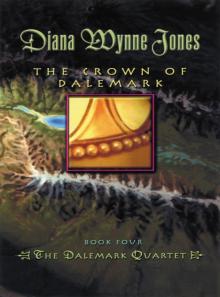 The Crown of Dalemark
The Crown of Dalemark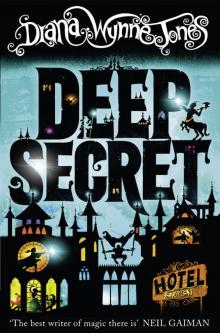 Deep Secret
Deep Secret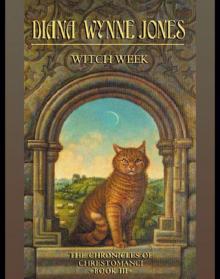 Witch Week
Witch Week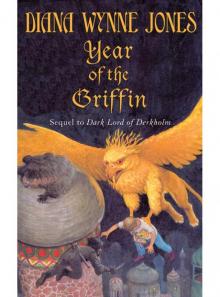 Year of the Griffin
Year of the Griffin Wild Robert
Wild Robert Earwig and the Witch
Earwig and the Witch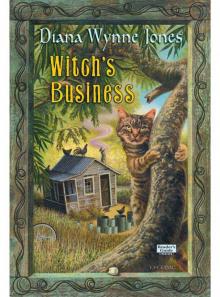 Witch's Business
Witch's Business Dogsbody
Dogsbody Caribbean Cruising
Caribbean Cruising Cart and Cwidder
Cart and Cwidder Conrad's Fate
Conrad's Fate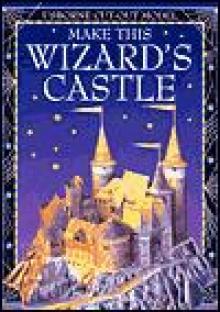 Howl's Moving Castle
Howl's Moving Castle The Spellcoats
The Spellcoats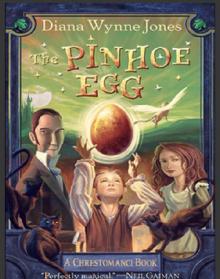 The Pinhoe Egg
The Pinhoe Egg Drowned Ammet
Drowned Ammet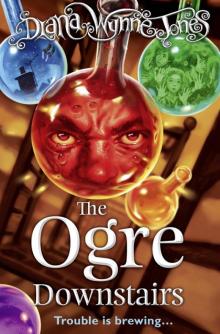 The Ogre Downstairs
The Ogre Downstairs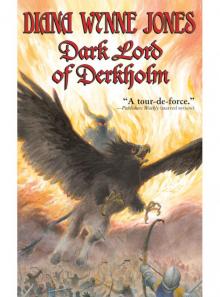 Dark Lord of Derkholm
Dark Lord of Derkholm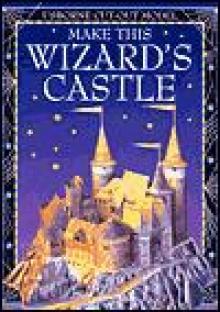 Castle in the Air
Castle in the Air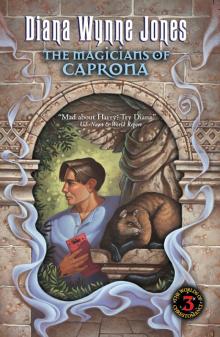 The Magicians of Caprona
The Magicians of Caprona A Tale of Time City
A Tale of Time City The Lives of Christopher Chant
The Lives of Christopher Chant The Magicians of Caprona (UK)
The Magicians of Caprona (UK)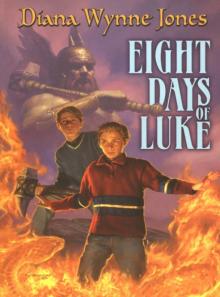 Eight Days of Luke
Eight Days of Luke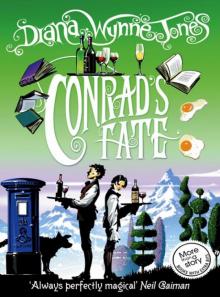 Conrad's Fate (UK)
Conrad's Fate (UK) A Sudden Wild Magic
A Sudden Wild Magic Mixed Magics (UK)
Mixed Magics (UK)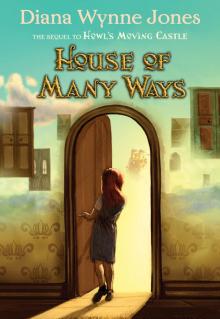 House of Many Ways
House of Many Ways Witch Week (UK)
Witch Week (UK) The Homeward Bounders
The Homeward Bounders The Merlin Conspiracy
The Merlin Conspiracy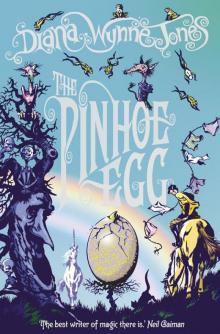 The Pinhoe Egg (UK)
The Pinhoe Egg (UK)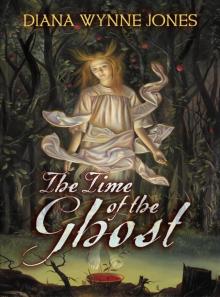 The Time of the Ghost
The Time of the Ghost Hexwood
Hexwood Enchanted Glass
Enchanted Glass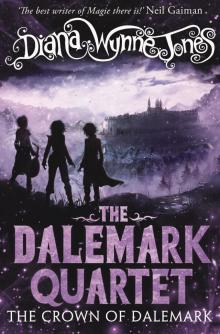 The Crown of Dalemark (UK)
The Crown of Dalemark (UK)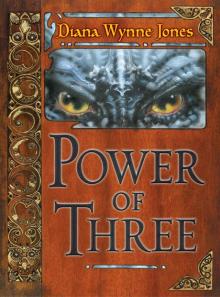 Power of Three
Power of Three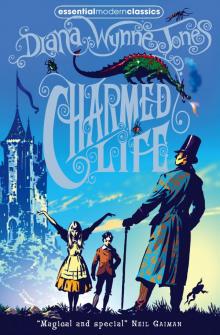 Charmed Life (UK)
Charmed Life (UK)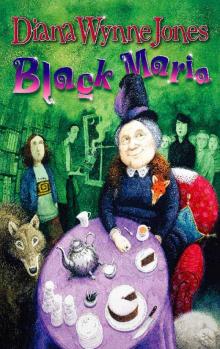 Black Maria
Black Maria The Islands of Chaldea
The Islands of Chaldea Cart and Cwidder (UK)
Cart and Cwidder (UK) Drowned Ammet (UK)
Drowned Ammet (UK) Charmed Life
Charmed Life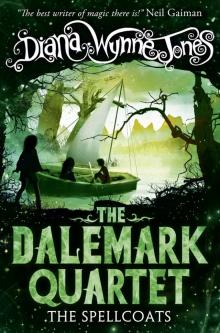 The Spellcoats (UK)
The Spellcoats (UK)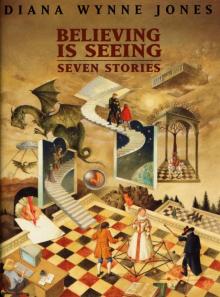 Believing Is Seeing
Believing Is Seeing Samantha's Diary
Samantha's Diary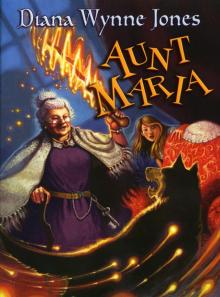 Aunt Maria
Aunt Maria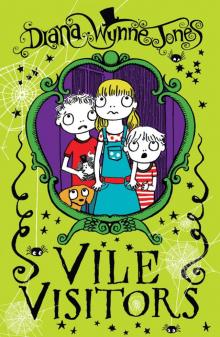 Vile Visitors
Vile Visitors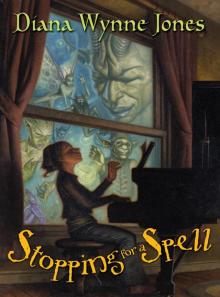 Stopping for a Spell
Stopping for a Spell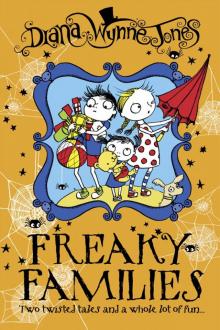 Freaky Families
Freaky Families Unexpected Magic
Unexpected Magic Reflections
Reflections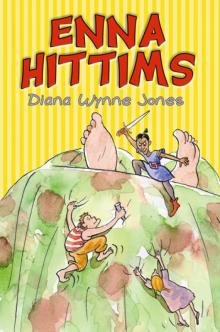 Enna Hittms
Enna Hittms Mixed Magics: Four Tales of Chrestomanci
Mixed Magics: Four Tales of Chrestomanci